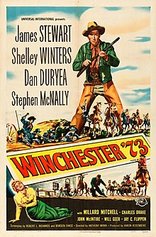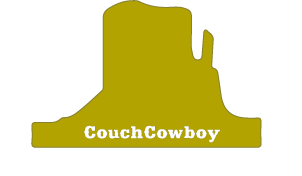 This is the first effort from James Stewart and Anthony Mann, and many consider it the best. The movie begins with the caption: "This is the story of the Winchester model 1873, 'The Gun that won the West'. . . . ." This is, in many ways, a film about a gun, and, as such, it does contain many documentary elements, blending historical references such as Wyatt Earp, Bull Run, Bat Masterson and Little Big Horn with a fictional family feud and love story between Stewart and Winters. Stewart is good here as he was in all of his later work with Mann, and it is nice to see him in that familiar sweaty hat which he wears throughout so many Westerns. Shelly Winters is capable as the dance hall girl with no small courage and a heart of gold. We were not able to identify either the young Rock Hudson or Tony Curtis and hope they did not spend too much time off camera with one another . . .
This is the first effort from James Stewart and Anthony Mann, and many consider it the best. The movie begins with the caption: "This is the story of the Winchester model 1873, 'The Gun that won the West'. . . . ." This is, in many ways, a film about a gun, and, as such, it does contain many documentary elements, blending historical references such as Wyatt Earp, Bull Run, Bat Masterson and Little Big Horn with a fictional family feud and love story between Stewart and Winters. Stewart is good here as he was in all of his later work with Mann, and it is nice to see him in that familiar sweaty hat which he wears throughout so many Westerns. Shelly Winters is capable as the dance hall girl with no small courage and a heart of gold. We were not able to identify either the young Rock Hudson or Tony Curtis and hope they did not spend too much time off camera with one another . . .
This is a good story built around a coveted rifle which changes hands frequently. There is some excellent suspence and action, particularly in a harrowing Indian attack and the final shootout. However, the scene with Shelly Winters driving a two-horse wagon at breakneck speed from pursuing Indians, though undoubtedly intended as cinematic thrill, provided unexpected comic relief to this critic. But such is often the case with the films of the fifties, and this one scene failed to fatally stain this strong Western.
Many critics identify "Winchester '73" as a landmark Western in that with it, Mann and Stewart brought a new sense of sophistication to the genre. With John Ford's classic and decidely sophisticated "My Darling Clementine" produced four years earlier, "Fort Apache" two years prior, and his also excellent "WagonMaster" released the same year as "Winchester '73", we aren't so certain that this film single-handedly elevated the refinement of the Western. Certainly, with its high quality in all aspects, it was a heralded release for the Western genre and the Mann-Stewart team were welcomed as collaboraters to join the Ford-Wayne efforts. But in the final analysis, not one of the Mann-Stewart Westerns -- including this -- can hold a candle to the best Ford-Wayne productions. Not one. This CouchCowboy critic invites and welcomes debate from any and all on this assertion.
There is another problem I have with "Winchester '73", aside from its lauded 'landmark' status. As noted the film makes several historical references. One I find problematic -- and it is the one most central to the film -- is the contention that Custer's army lost at Little BigHorn because the Sioux had repeating rifles and the Seventh Calvary did not. I believe this contention a Hollywood fiction, another minor Western myth introduced to lubricate the gears of this plot. First, as we all know, there are few accounts of the battle of Little Big Horn since all the US army soldiers were killed. Second, despite opportunistic gun-trading in the West -- which certainly occurred -- is it likely that the Sioux would have repeating rifles before the army? And would they have them in sufficient numbers to overwhelm Custer and his 600 troops? One of the few accounts of Little Big Horn which stands of record is that of Wooden Leg, an 18-year old Cheyenne warrior. His account indicates that the Indians did have rifles, but his recollection of the comparative firepower belies the repeating rifle theory of "Winchester '73": "The soldiers were on the level valley ground and were shooting with rifles. Not many bullets were being sent back at them, but thousands of but thousands of arrows were falling among them." (From Native American Testimony, quoted in Hine & Faragher, The American West.) The theory that repeating rifles caused Custer's defeat is an excellent example of attempted Hollywood myth-making to skew Western history, in this case offering an excuse -- other than Custer's ignorant recklessness -- as to why the Indians destroyed the Army. This is why I object to the critical characterization of this film as a Western of fresh sophistication and accuracy. Though Ford's "Fort Apache" (1948) presents a fictionalized account of Custer and Little Big Horn, it is at least a more accurate representation of the Indian Wars, depicting Custer's vanity and foolishness. "Fort Apache" additionally addresses the subsequent mythologizing of his heroism, the very mistake to which "Winchester '73" falls prey. So again, this movie should be enjoyed as the solid Western which it is, but not recognized as a refined historical Western. Ford had been doing that long before Mann, and Mr. Mann certainly could have used a few lessons from the master. However, all in all, this is certainly a fine Western, one that we would rate a CLASSIC if not for its improbable repeating rifle conspiracy theory. Despite this, "Winchester '73" stands for us as a MUST SEE.
--JED
Cast:
- James Stewart....Lin McAdam
- Shelley Winters....Lola Manners
- Dan Duryea....Waco Johnnie Dean
- Stephen McNally ....Dutch Henry Brown
- Millard Mitchell....High-Spade Frankie Wilson
- Charles Drake....Steve Miller
- Will Geer....Wyatt Earp
- Jay C. Flippen.... Sergeant Wilkes
- Rock Hudson....Young Bull
- John Alexander .... Jack Riker
- Steve Brodie ....Wesley
- James Millican....Wheeler
- Abner Biberman....Latigo Means
- Tony Curtis....Doan
- James Best....Crator
